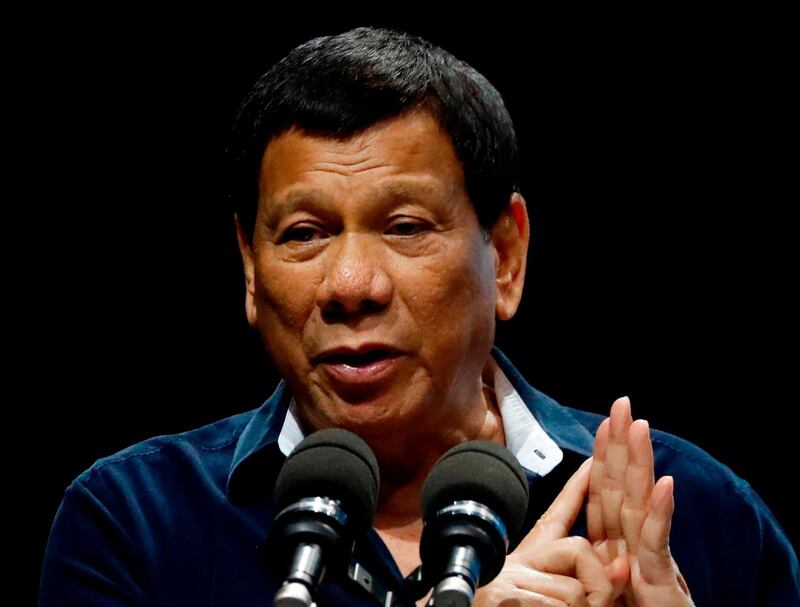Philippine President Rodrigo Duterte apologised to Kuwait on Sunday for his "harsh" words at the height of a months-long diplomatic row over the treatment of domestic workers.
The spat began in February when a murdered Filipina maid was found in her employer's freezer in Kuwait City, prompting Mr Duterte to lash out at the "inhuman" treatment of migrant workers and ban workers from travelling to Kuwait.
"For the first time I would say that I was harsh in my language maybe because that was a result of an emotional outburst. But I'd like to apologise now," Mr Duterte said, addressing Kuwait directly in a speech before expatriate Filipinos living in South Korea.
"I'm sorry for the language that I was using but I'm very satisfied with ... how you responded to the problems of my country."
Authorities in Manila say about 262,000 Filipinos worked in Kuwait before February, with many employed as household maids.
They are among over two million Filipinos employed in the Arab Gulf region, whose remittances are a lifeline to the Philippine economy.
At the height of the diplomatic row, Mr Duterte alleged that Arab employers routinely rape Filipina workers, force them to work 21 hours a day and feed them scraps.
"Is there something wrong with your culture? Is there something wrong with your values?" the Philippine leader had said.
Kuwaiti authorities expelled Manila's envoy in April over footage showing embassy staff helping Filipino workers flee allegedly abusive employers in Kuwait.
Tensions cooled last month after the two nations sealed an agreement on workplace safety guarantees for Filipinos working in Kuwait, prompting Mr Duterte to lift the employment ban.
On Sunday, the Philippine president said he hoped to visit Kuwait to express his gratitude.
"I'd like to thank the Kuwaiti government for understanding us and keeping their faith [in] us and practically [giving in] to all of my demands," Mr Duterte said.
His demands included giving Filipino workers a day off and seven hours of sleep each night, as well as allowing them to keep their passports and phones - often confiscated by employers, he said.
Mr Duterte, known for his outspokenness and use of strong language, was not so conciliatory towards a United Nations rights expert who criticised him for threatening the country's former chief justice.
Diego Garcia-Sayan, the UN special rapporteur on the independence of judges and lawyers, had said the president's statements against Maria Lourdes Sereno were a "vicious attack" on the judiciary.
Ms Sereno's colleagues voted to remove her from office last month, shortly after Mr Duterte openly called her his "enemy" and demanded her swift ouster.
"Tell him [Garcia-Sayan] not to interfere with the affairs of my country. He can go to hell," Mr Duterte told reporters in Manila on Saturday, insisting he had nothing to do with the chief justice's dismissal.
"He is not a special person and I do not recognise his rapporteur title."
Mr Duterte, 73, has lashed out in the past at critics of the deadly drug war he launched soon after coming to power in 2016.
Several of his opponents have since been removed from office, punished or threatened.
Police say they have killed 4,279 drug suspects in the anti-narcotics campaign but rights groups believe the actual number is three times higher.
Ms Sereno was one of the few remaining high-profile critics of the crackdown at the time she was sacked.





